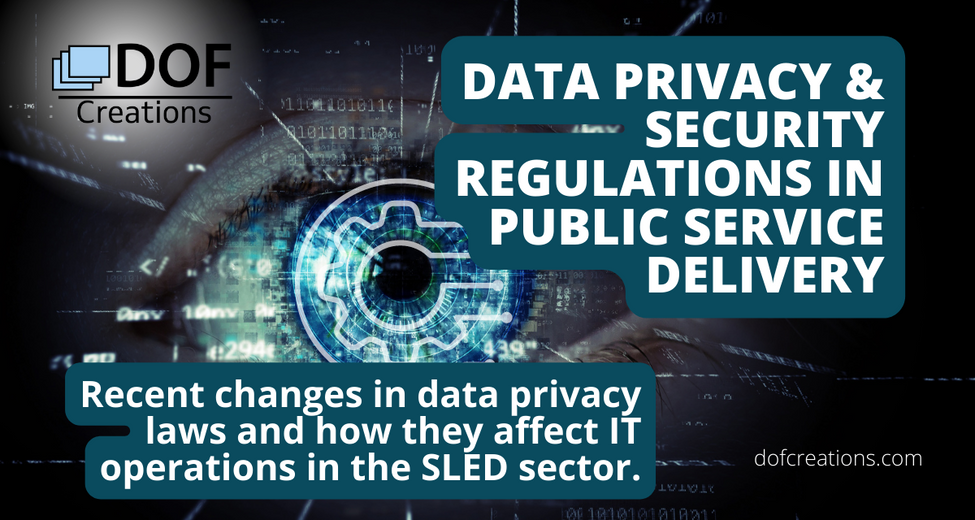Data Privacy & Security Regulations in Public Service Delivery
In the digital era, data is the new oil – a resource with immense value but also a source of significant concern, discussion, and regulation. The protection of personal data has become a critical issue for individuals, businesses, and governments alike. This is particularly true for Public Sector entities, which collect, store, and process vast amounts of sensitive data as part of their public service delivery. Below, we delve into the evolving landscape of data privacy and security regulations and their implications for IT operations in the public sector.
The Shifting Regulatory Landscape
The General Data Protection Regulation (GDPR)
Although European in origin, the GDPR’s effects have been felt worldwide, impacting any organization that handles the data of EU residents. The GDPR emphasizes principles like data minimization, purpose limitation, accuracy, consent, and the rights to access, rectify, and erase personal data.
The California Consumer Privacy Act (CCPA)
The CCPA, effective from 2020, provides California residents with unprecedented data rights, including the right to know what personal information is collected, access to personal information, and the right to delete personal information held by businesses. The law applies to many SLED entities, particularly those interacting with or serving California residents.
The Virginia Consumer Data Protection Act (VCDPA)
The VCDPA, enacted in 2021, has many similarities to the GDPR and the CCPA, including the rights to access, correct, delete, and obtain a copy of personal data. This law underscores the trend towards broader data privacy laws in the US, affecting SLED entities operating in or serving residents of Virginia.
Impact on Public Sector IT Operations
Enhanced Cybersecurity Measures
To comply with these laws, SLED entities must prioritize cybersecurity. This involves implementing technologies like encryption, multi-factor authentication, and intrusion detection systems to protect data. Regular audits and penetration tests should also be conducted to identify and rectify potential vulnerabilities.
Data Governance and Management
Data privacy laws necessitate strict data governance and management protocols. SLED entities need to have a clear understanding of what data they have, where it is stored, who has access to it, and how it is used. They also need to be able to respond to data subject requests, such as requests for access or erasure, promptly and effectively.
Vendor Management
Given the extensive use of third-party vendors by SLED entities, ensuring vendor compliance with data privacy laws is a key challenge. Contracts must be reviewed and updated to include necessary data protection clauses, and comprehensive vendor assessments should be carried out to evaluate their data protection capabilities.
Navigating the Regulatory Maze: Best Practices
Continual Monitoring and Adaptation
The regulatory landscape is continually evolving, and SLED entities must keep abreast of changes. Regular consultation with legal experts, attending industry seminars, and subscribing to legal updates can help in this regard.
Privacy-by-Design
Adopting a privacy-by-design approach, where privacy is considered at every stage of a project or process, can help ensure compliance. This approach emphasizes proactive rather than reactive measures and can help prevent privacy issues from arising.
Employee Training
A strong data privacy culture is crucial. Regular training should be provided to all employees, not just those in IT, to ensure they understand the importance of data privacy and their role in ensuring it.
DOF’s Thoughts
The changing regulatory landscape presents a significant challenge for SLED entities, but it is also an opportunity to build trust with the public. By demonstrating a commitment to data privacy and security, these entities can show that they not only respect the rights of individuals but also recognize the value and sensitivity of the data they hold. Through vigilance, adaptation, and a commitment to privacy, SLED entities can navigate this complex regulatory landscape and fulfill their obligations to the public.
Future of Data Privacy in Public Service Delivery
Looking ahead, it is clear that data privacy and security regulations will continue to shape public service delivery. As more states and countries enact their own data privacy laws, SLED entities will need to remain agile and responsive. Furthermore, as technology continues to advance, new challenges will inevitably arise. Emerging technologies such as AI and IoT present new frontiers for data privacy, requiring further adaptation and regulation.
The role of IT in managing these challenges will be crucial. By leveraging technology effectively, IT departments can help SLED entities maintain compliance, protect sensitive data, and ultimately, deliver better public services. From implementing advanced cybersecurity measures to adopting robust data governance practices, IT can provide the tools and expertise necessary to navigate the evolving regulatory landscape.
While the road ahead may be fraught with challenges, there are also unprecedented opportunities for SLED entities to leverage data in a safe, secure, and compliant manner. By embracing these changes and investing in data privacy and security, they can enhance their service delivery, build trust with the public, and lead the way in the responsible use of data. As we move into this new era of data privacy, the guiding principle for SLED entities should be clear: respect for data privacy is not just a regulatory requirement, but a commitment to the individuals they serve.



